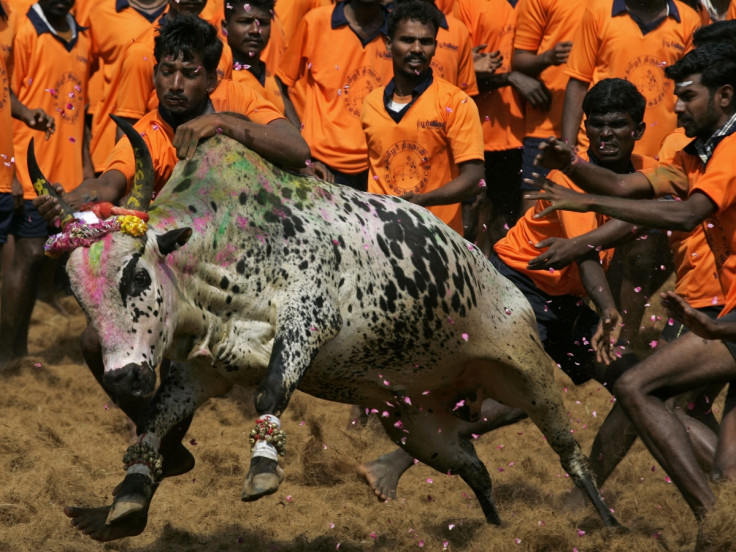Jallikattu debate: Animal rights experts expose 'cruelty' of Indian bullfighting tradition

The Supreme Court of India has issued a hold on a government order to lift a ban on Jallikattu, a form of bullfighting that is popular in the southern state of Tamil Nadu. The Supreme Court announcement came on 12 January, prompting widespread discussion about the decision across the country.
The hashtag #WeNeedJallikattu began trending on Twitter soon after the decision was made to keep the ban in place, with thousands of Hindu worshippers saying that the sport was a crucial part of the upcoming Pongal festival. Jallikattu, one of India's oldest sports, sees people chase after and tackle bulls to get prizes that are tied to their horns.
The sport was banned in May 2014 by the Supreme Court on grounds of animal cruelty. However, on 7 January Prime Minister Narendra Modi's government briefly lifted the ban on Jallikattu, before the Supreme Court issued a hold on the order. Animal rights activists from Peta India have welcomed the Supreme Court's ruling, saying that the bullfighting tradition violated the Prevention of Cruelty to Animals Act 1960.
Bhuvaneshwari Gupta, campaigns advisor at Peta India, told IBTimes UK: "The very point of Jallikattu is to terrify bulls so that they run in a panic. As any animal behaviourist will confirm, Jallikattu exploits bulls' natural nervousness as prey animals by deliberately placing them into a terrifying situation in which they are forced to run away from those they perceive as predators."
An investigation conducted by Peta in 2013, when the last Jallikattu event was held, revealed the extent to which the bulls are mistreated for the festival. Peta's footage showed that the animals were subject to having their tails twisted and bitten by contestants, are often stabbed by spears, knives or sticks, and are also punched, jumped on and dragged to the ground during the sport. Gupta also explained how the bulls were "often deliberately disorientated" by forcing alcohol into them.
In some instances, Peta has found that the bulls are so terrified during the Jallikattu games and the "menacing mob" that chases after them that they desperately try to escape, often slipping, jumping off cliffs, and sometimes even running into traffic. The animal rights experts have said that this has often led to "broken bones" and "death".
"In bull races, bulls run because people are inflicting pain on them," Gupta explained. "They are hit with everything from bare hands to nail-studded sticks, and their tailbones are broken at each joint. This is as painful to bulls as it would be to us if someone were to break our fingers joint by joint. It should be prosecuted, not sanctioned."
In making the comparison to human suffering, Gupta also said that the sport was harmful to people. According to Peta, more than 1,000 humans had been injured while participating in Jallikattu between 2010 and 2014. Approximately 17 people are believed to have died, although Gupta said that these figures are likely to be higher as many injuries allegedly go unreported.
Gupta said: "As long as Jallikattu is allowed, cruelty to bulls, and injuries and death to people and bulls will continue."
© Copyright IBTimes 2025. All rights reserved.




















